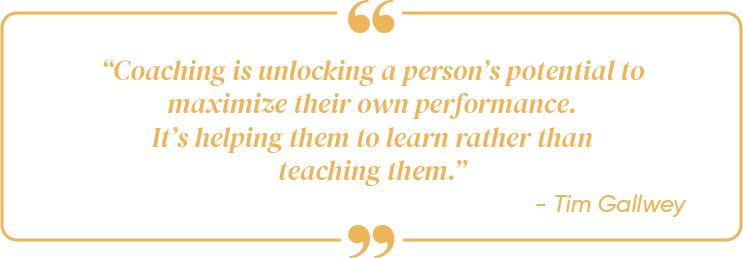A Beginner’s Guide to Leadership Coaching
How to Confidently Coach World-Class CEOs, Leaders,
and High Achievers

Featured Articles
- 1What Is Leadership Coaching?
- 2How Can Leadership Coaching Help You?
- 3Who Does A Leadership Coach Work With?
- 4Executive Coaching Vs Leadership Coaching: Key Similarities And Differences
- 5
- 6Principles Of Leadership Coaching
- 7Do Leadership Coaches Need To Be Leaders?
- 8Coaching The Next Generation Of Leaders
- 9How To Become A Leadership Coach
In today's rapidly changing world, we are in more need of great leaders than ever before.
Leaders that can influence, inspire, thrive through uncertainty, and create a positive impact in their environments while doing so.
And just as great teams and people are led by great leaders, great leaders also need someone to help them continuously grow.
That's where you come in.
The leadership coach.

In this guide, we'll uncover how to unpack your hidden gifts and step into a place of authentic confidence, so you can reach your highest potential as a leadership coach.
You'll learn exactly what a leadership coach does, how they think, what leaders and CEOs expect from their coach, what leaders want and need, and the essential principles for masterful leadership coaching.
If you want to become an expert in leadership coaching, if you want to create real, lasting impact for high-achievers, if you want to make a difference in the world, you're exactly where you need to be...
Reading this, right here, right now.
What is Leadership Coaching?
All forms of coaching share the same fundamentals. Therefore, coaching any niche is the same. However, how you coach and what your clients need varies greatly depending on your coaching niche.
A leadership coach works with clients to maximize performance and increase their leadership skills in the workplace, but their actionable guidance, advice, and steadfast support transform the leader’s personal life positively.
Leadership coaching trains leaders to work more effectively with others and utilizes a conscious process of developing talents and individual competency.
Leadership coaching focuses on different aspects of mentoring and leadership, such as effective communication and business coaching, while also understanding the impact of different styles
Leadership coaches tend to ask the right questions rather than give the right answers, active listening rather than lecturing, and give options rather than instructions. This is designed to help leaders push their teams towards pursuing goals and maximizing organizational resources.
How can Leadership Coaching help you?
Leadership coaching has many benefits for both the leaders of the organization as well as the teams that work under them.
1. Better Insight
Having a leadership coach present gives an organization a new outside perspective on things which can be an extremely powerful insight into what changes should be made to have a meaningful and lasting impact.
2. Improved Communication
Leadership coaches help clients find the weak spots in their communication style and help them overcome these weaknesses to achieve perfect clarity in their messages. This helps the leaders and teams in the organization as it improves the quality of their entire workflow.
3. Enhanced Performance
Coaching can lead to significant improvements in a client’s attitude and ability. This helps them examine their weaknesses more accurately and gain a better perspective on how to make better use of their abilities.
4. Free thinking
By asking the leader questions that prompt them to tackle problems from a new perspective, leadership coaching helps broaden thinking styles and encourage greater flexibility in thinking. With the rapid changes in technology and development happening today, this ability to be flexible in your thought process is important to keep up with consumer trends.
5. Empowerment
Good coaching empowers and motivates leaders to do their best work. The best coaches can familiarize themselves with their client's strengths and weaknesses and help them make maximum use of their strengths to overcome obstacles to their goals.
6. Confidence
When a leader applies all the skills that they gained through coaching and helps their team make meaningful changes and celebrate more wins, their confidence increases, and this, in turn, helps them become a better leader.
7. Job and Life Satisfaction
With the better insight and awareness that leaders can achieve from coaching, they can find a better work/life balance more easily. This helps them achieve better performance and increased satisfaction with their job and keeps them from hitting burnout phases which can lead to a drop in team morale.
Who does a Leadership Coach work with?

Indra Nooyi was born in Tamil Nadu, India, during the 1950s. She went on to become one of the world's most powerful women. A graduate of Yale University, she's been on the Wall Street Journal's Women to Watch list, Time's 100 Most Influential People in the World list, not once but twice, and Forbes' The World's Most Powerful Women list.
As the game-changing, bold, decisive, and award-winning CEO of PepsiCo from 1994 to 2018, Indra Nooyi has broken barriers, smashed glass ceilings, and led the second-largest food and beverage company to great success and greater profits.
According to Forbes, PepsiCo is one of the most valuable names in the world, with a brand value of $18.4 billion in 2018 — an achievement that's largely credited to Nooyi.
So, what's this got to do with coaching? What's this got to do with you? Everything.
Nooyi says,
“If I hadn't had mentors, I wouldn’t be here today. I’m a product of great mentoring and great coaching… Coaches or mentors are very important.”
While Indra Nooyi is the one who gets the recognition and rewards in the eyes of the world, she didn’t get to the top on her own. World-class leaders like her never do. They have transformational teachers, mentors, and coaches supporting, guiding — and sometimes even leading — the way.
In a more complex and rapidly changing world, it is increasingly hard to keep up with the rapid technological changes and consumer trends. Business leaders cannot always know it all and drive their team in the right direction every single time. This is where having a leadership coach becomes a very important asset. Having an outside perspective on things helps businesses identify the weaknesses within their organization and use this awareness to make long-lasting and effective changes in their corporate structure.
Leaders who have this drive to learn new ways to help their teams maximize their potential are the ones who can benefit greatly from having a coach to guide them. These coaches help the leaders bolster collaborative effort in their teams to make sure that their strengths compound and thereby minimize their weaknesses.
Executive Coaching vs Leadership Coaching: key similarities and differences
Executive coaching is focused on creating results in a business or entrepreneurial environment. Executive coaches, as its name stated, work with a company’s executives and high-level managers on their personal career goals as well as business goals like creating multiple revenue streams, cultivating growth and expansion, or hitting specific monthly and yearly income goals.
Leadership coaching is like executive coaching in the sense that coaches work with clients to work out strategies and techniques that are beneficial for the business and cultivate organizational growth. But it is still a different ballgame. It's about working with high achievers and leaders — from CEOs of international corporations to ambitious entrepreneurs — to bring lasting positive, impactful change to their internal and external world, and help them achieve even higher levels of success
Leadership coaches help their clients experience heightened motivation, creativity, and inspiration.
Leadership coaching also stands out from all other types of coaching in one very significant way: A leadership coach creates a powerful ripple effect in the entire organization.

When a client starts to hit exponential levels of professional growth and development, the effect spreads all the way out to everyone else in the organization or team. This makes sense when you think about it. A happy, effective, powerful, and focused leader equals a happy, effective, powerful, and focused team.
Leadership Coaching styles
Throughout history, there have been many great leaders who have come up with different styles of leadership. Broadly, these can be grouped into five categories:
Authoritarian leadership
In this style of leadership, the leader is the most knowledgeable person in the team and is expected to impose expectations and define outcomes.
Participative leadership
This is a more democratic style of leadership and tries to involve team members in the decision-making process. Even though the leader will normally have the last word, the team members still feel included, which motivates them to contribute more.
Delegative leadership
A delegation leadership style focuses more on assigning different assignments to team members. This is a good strategy to involve team members who like to take responsibility and engage in individual work.
Transactional leadership
Transactional Leaders use rewards, punishments, and other exchanges to reward team members for complying with the goals they set.
Transformational leadership
This kind of leader inspires their followers with visions and serves as a role model for the team members to follow.
A good leadership coach helps leaders identify the specific type of leadership style that would work for certain teams and organizations. Developing your leadership coaching style is an important part of becoming a good coach. Understanding and strengthening your leadership style helps leaders work on their strengths and weaknesses, and practice leadership in different situations.
Principles of Leadership Coaching
Being a leadership coach is all about creating a safe and supportive environment for your clients. They need to be challenged to come up with solutions for their problems, but they also need to feel safe enough in their environment to be creative in these solutions.
You also need to work within your client’s agenda. The coaching session is about the client, not the coach. The coach should never try to impose their priorities into the coaching dynamic. It is a collaborative relationship, and the client is the one who needs to see positive rewards, so it is your job to accommodate this and work with the client to achieve their goals.

A leadership coach needs to advocate self-awareness and promote learning from experience. You need to help your client recognize their own strengths and weaknesses. If you can demonstrate a sense of self-awareness in yourself, the client is also more likely to learn from that and try to be more aware of themselves and their thought processes.
Being a model for what you coach is an important trait that any good leadership coach should have. You should be able to inspire other leaders to follow you and see in your words and actions what they must gain from you.
Do Leadership Coaches Need To Be Leaders?
One of the things I hear gifted coaches say all the time is...
"Ajit, I can't coach leaders because I'm not as successful as they are."
There's a strong belief in coaching circles and it goes something like this: If you want to be an awesome leadership coach, if you want to coach top performers and high achievers...
You have to be stronger, better, faster, smarter and wealthier than them.
This is total B.S.!
Leadership coaches do not need to be great leaders, they need to be great coaches. Coaching is their job. Not leading.
This might seem obvious but so many great coaches - people who would make brilliant leadership coaches - mix things up and give up on their dream.
I don't want that to happen to you.

A good friend of mine, best-selling author and master leadership coach, Michael Neill, talks about the key thing you need to know about being a leadership coach.
He tells the story of a client of his who is a lieutenant in the army. Michael asked the lieutenant, "Who is the best leader you've ever had?"
And the Lieutenant replied that it was someone who was below him in rank, a sergeant, who had an amazing ability to "lead up" with his higher officers and "lead down" with those under his command.
This sergeant was gifted at creating a genuine connection with people. He could motivate and inspire them to be their best whether they were above or below him in rank.
Michael explains that this is the skill that leadership coaches need...
To know that they can "coach up" and "coach down" at any time.
To know that their job is to be the best coach they can be.
Not to be the best leader. Or the best performer. Or the highest achiever.
The job is to be the best coach and to overcome that feeling of doubt, intimidation and overwhelm that comes up when super successful people are in the room.
There's a strategy you can use to make this happen.
It's a simple but incredibly powerful mindset shift.
First thing to keep in mind...
It doesn't matter who your clients are -- top CEOs, world-class entrepreneurs, big name celebrities and influencers, legendary sports personalities - they just want one thing...
To become better than they already are.
They want to rise higher and reach for more.
This is a basic need for all leaders and high achievers.
It's like the air they breathe.
And you can help them get there when you show up fully and effectively as a leadership coach...
When you shift into the mindset of service and coach from the heart and not the mind.
You need to forget about saying and doing the right things as a coach. Or trying to use every single tool and technique in the book to keep your sessions "interesting."
You need to forget about impressing the client and focus on helping them get more from their work, their lives, and from themselves.
When you shift your focus and attention away from what the client thinks of you and you start to think about how you can help them...
Doubts and fears fall away, and all that's left is the thing you love to do most...
Coach.
Coaching the next generation of leaders
Leadership coaching also stands out from all other types of coaching in one very significant way. Even if they haven't had the chance to connect with a coach in a 1:1 environment, leaders and high achievers have probably experienced training and teaching programs or courses designed to help them get better at what they do.
When becoming a leadership coach, your job is made easier because high-level clients are already coachable. They're committed to becoming better, investing time and resources in their development, and they are willing and eager to learn.
But their previous experiences with coaching, mentoring, and training can also make your job a little more complicated. High-level clients already have beliefs about what coaching can and cannot do for them. And most times, these beliefs can be very limiting and keep them in a fixed mindset - even if they might have a growth mindset in other aspects of their life.
As a leadership coach, your job is to break past these preconceived ideas and get them to a place where their minds and hearts are clear and open to new learnings, behaviors, and experiences in coaching.
The most powerful fundamental thing you can bring to an extraordinary coaching session with a high-level client is present-moment awareness. This happens when you release all thoughts and ideas and bring your full self on all levels to each moment in the coaching session.
Present moment awareness creates 2 incredible results:
A genuine, deep connection
with your client
Insights, ideas and creative
solution that appear as if out of nowhere
When you consciously set aside your thoughts and start to listen to your client from a place of love and a commitment to help, you'll demonstrate your true desire to be of service. You'll create a deep connection and a real relationship based on trust. Due to the nature of their work, CEOs, celebrities, athletes, and other high-level clients aren't always sure they can trust the people around them. So, building genuine connections and trust with them is beyond priceless. It leads to a sense of safety that allows your client to truly open up and go deep. It's the secret key all world-class leadership coaches use to work with high achievers.
Present moment awareness also leads to the second thing on the list — new insights, ideas, and creative solutions. It creates the one thing that will take you to the top level of world-class leadership coaching: A personal, signature style or coaching methodology.
While it's okay to work with general coaching strategies when you're starting, truly great leadership coaches quickly learn to dive into their own experience and intuitive knowledge so they can build their coaching methodology.
Creating your methodology allows for the flow and flexibility that's missing from the old-school, rigid coaching strategies. When you have your methodology, you'll easily find ways to shift and change it to fit each individual coaching client.
How to become a Leadership Coach
Now you know what leadership coaching is and the needle-moving elements to create real trust and connection with any high-level client.
If you've ever dreamed of coaching top performers, leaders, CEOs, and high achievers, but you've held yourself back because you're thinking...
Who am I to coach leaders?
I'm not good enough.
I don't have what it takes.
I can't coach leaders, they are far more successful than me!
High-level clients will never hire me...
I want you to stop, take breath and clear your mind because what I'm about to say is going to change everything...
You can be a leadership coach because you already have the most important elements to make it happen: your drive, your ambition and your passion to work with high-level individuals.
I know you have it in you because you wouldn't be reading this if you didn't.
The first thing you need to do is define your coaching purpose.
When you think about the definition of coaching leadership, what are the doubts and fears that come up for you?
Grab a pen and a piece of paper, and write them down right now. You can use some of the examples that I shared in this chapter and add on as many as you like.
Take as much time as you need with this activity and be gentle with yourself. Facing your fears is a brave thing to do and rushing through this can block the process.
When you're done with your list, take a deep breath calming breath, then ask yourself...
“Why do I want to be a leadership coach?”
Make this "why" as BIG as you can... bigger than your fears. You want this "why" to motivate, inspire, and fuel you.
Your why could be...
"I want to coach high achievers and help create great leaders so I can transform the way the world works"
or
"I want to make a massive difference in the world by positively changing the way leaders lead and inspire others"
or simply
"I want to follow my purpose and my calling. I know I was born to coach leaders and I'm ready to follow my path."
The only rule is that your "why" is powerful, purposeful, and REAL for YOU.
Write this why and keep it where you can see it every day.
And you'll be well on your way to becoming a phenomenal leadership coach!